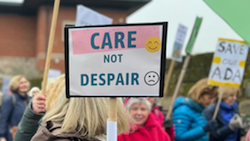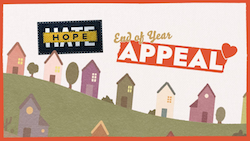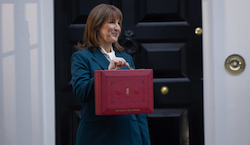Appalled by the continuing violence in Gaza, CHRIS WILSON surveys the progressive forces in Israel and Palestine seeking hope for future progress and reconciliation.
Like most people, I have found the daily media diet of violence in Gaza deeply disturbing. It is not surprising that some countries have now recognised Palestinian statehood even if there is still no clear sense of what that might look like or whether it would advance or diminish the case for a lasting peace. Time will tell whether such actions are far-sighted or premature.
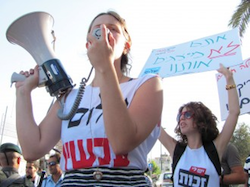 The Labour Party’s call for an agreed ceasefire is surely the right one but how this will be achieved in the current climate is difficult to see, particularly with Hamas on the one side and the hard-right Israeli government on the other. There is also an urgent need for humanitarian aid and – just as important – for more hostages to be released. They too are innocents, caught up in a conflict not of their own making.
The Labour Party’s call for an agreed ceasefire is surely the right one but how this will be achieved in the current climate is difficult to see, particularly with Hamas on the one side and the hard-right Israeli government on the other. There is also an urgent need for humanitarian aid and – just as important – for more hostages to be released. They too are innocents, caught up in a conflict not of their own making.
Above all, we must always take care not to confuse the views of leaders with those of the people. Governments and peoples are not the same thing, whether they be in Gaza, Israel, Iran, Syria, or any other place currently scarred by violence or war. The challenge for the broad left, surely, is to identify those social forces working for peace, to support them and encourage them, and to help the wider progressive forces expand the space in which they can operate.
It may not always be apparent from the outside but there is still a left movement in Israel, including political parties, trade unions and active peace organisations. At the very least, we should be aware of them and understand the contribution they might make towards a settlement that respects the chosen identities and national aspirations of all.
No-one would suggest this is easy, but we should at least know about the people who are trying – however imperfectly – to build trust and understanding, for this is the essential building block to progress.
We might begin, for example, with Peace Now (pictured above). Formed in 1978, it seeks peace, compromise and reconciliation with the Palestinian people and neighbouring Arab states, opposes the expansion of Israeli settlements on the West Bank, and supports a two-state and two-peoples solution to the conflict, based on a return to 1967 borders. It is an extra-parliamentary movement powered by young and committed activists who are no doubt getting a hard time at present from the Israeli hard right. It’s important to acknowledge their presence and their witness.
Then there is Meretz, a left-wing party established in 1992 when three smaller left-wing groups merged – Ratz, Mapam and Shinui. In 1996 it held 12 seats in the Knesset but it has been less successful since and currently holds none. Nevertheless, as an affiliate of both the Socialist International and the Progressive Alliance, its presence reminds us that there is an alternative political vision within Israeli society.
Meretz supports a two-state solution, the Geneva Accord and separation of religion and state, as well as human and LGBT rights. Its current leader is Zehava Galon, president of the research institute for Equality and Human Rights, ZULAT. It also has a lively support network in the UK.
The Israeli Labor Party is also a member of the Progressive Alliance (but not the Socialist International). Centre-left and social democratic in its orientation, Labor currently holds four seats in the Knesset and is chaired by Meray Michaeli. It has actively supported peace talks with the Palestinians and its former prime minister Ehud Barak remains a prominent critic of current premier Benjamin Netanyahu.
Women & parents
Many other groups can be found away from party politics, including the Parents’ Circle Family Forum, an organisation formed in 1995 to bring together families from both sides who have experienced loss. It seeks to promote peace and reconciliation, publishes a monthly newsletter in Hebrew and Arabic, and helps Palestinians and Israelis tell their stories.
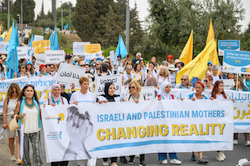 The Women Wage Peace group (pictured left) is also engaged in peace-building. A ‘non-partisan’ movement of some 50,000 members, it aims to build trust across communities, working with Women of the Sun, its Palestinian sister organisation.
The Women Wage Peace group (pictured left) is also engaged in peace-building. A ‘non-partisan’ movement of some 50,000 members, it aims to build trust across communities, working with Women of the Sun, its Palestinian sister organisation.
Then there are humanitarian organisations. Leaving aside the excellent work of the Red Cross, Red Crescent, and Magen David Adom, all of which deserve wider appreciation, there is the Road to Recovery NGO, a group of Israelis who transport Palestinians to and from hospitals.
Some of Road to Recovery’s leading activists were murdered or abducted by Hamas during the 7 October terror attacks and two are still in captivity. Yet the organisation continues to drive Palestinian patients to and from health care facilities, a small act of kindness that shows a better world is possible.
Among the trade union groups are Histadrut, the General Organisation of Workers in Israel, and its sister body, the Palestinian General Federation of Trades Unions, PGFTU.
In 2016, Histadrut claimed 27% of Israel’s workers as members, and in 2023 mobilised them for a brief general strike against Netanyahu in protest over the dismissal of a cabinet member and in opposition to judicial reform. It now represents migrant workers as well as Israelis, something it had been criticised for not doing in the past, and it has collected members’ subscriptions for the PGFTU.
The PGFTU website is also worth a visit, not least as trade union activists in Gaza have been targeted by Hamas since they came to power in 2007.
Finally, there is still a far left in Israel, including various organisations in the Marxist tradition, such as Maki, the Israeli Communist Party. It is now part of the left group, Hadash-Ta’al, which holds three seats in the Knesset and favours a two-state solution. Maki’s existence remains – in its own way – evidence that Israeli politics is much more diverse than some might think.
An agreed end to the war in Gaza is rightly a priority, as is the return of the hostages. But then what?
Politics in any country is rarely black and white, so at the very least, let’s try harder to understand the nuances of Israel and Gaza beyond the slogans; let’s identify and support progressive forces wherever they may be found as they strive to lay the foundations for a lasting peace.
What that lasting peace will look like, I do not know, nor is it my call. That decision can only belong to those directly involved. But I would suggest some of the above actors will be involved. And for that reason, if no other, we should acknowledge their presence and applaud their work.
‘Blessed are the peace makers,’ as someone once said.
—-
The Reverend Chris Wilson serves on the national executive committees of the Community Union and the Co-operative Party. He is a member of Christians on the Left. He writes in a personal capacity.
